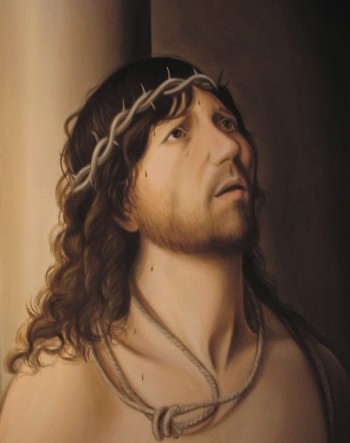Blessed are they that mourn
Jesus Christ is true God and true Man. The words and deeds of Jesus Christ during His life on earth were human words spoken by a Divine Person; for this reason they can be called mysteries. His deeds were perceptibly human deeds worked by a Divine Person; for the same reason, His deeds can also be called mysteries. Insofar as the words of Christ were uttered by One who is True Man, they were uttered in a given moment, place, and circumstances; being words of One who is True God, His words endure forever, losing nothing of their immediacy, nothing of their power, nothing of their effect. Insofar as the deeds of Christ were done by by One who is True Man, they were done in a given moment, place, and circumstances; being deeds of One who is True God, His deeds remain eternally present to His Father and forever available to His Church, losing nothing of their immediacy, nothing of their power, nothing of their effect.
The Most Holy Eucharist
Mother Mectilde de Bar, the Benedictine mystic who is most representative of the French School of spirituality, probed deeply the mystery of the words and deeds of Christ, and the divine permanence of all the states through which He passed on earth. In the Most Holy Sacrament of the Altar she found all the mysteries of Jesus Christ. She writes:
We must never depart from the holy ciborium or, rather, from the Heart of Jesus the Host. There we receive the grace of all His mysteries, because there do they all come together in the Most Holy Sacrament. There I find the mystery of the birth of Jesus. In short, we have there the mystery of His circumcision, and of the Epiphany, which is the manifestation of Jesus Christ, we have there His baptism, His hidden life, his conversation. In a word [the Most Holy Sacrament] contains all the mysteries. This august Sacrament is what is most divine in all that the Church possesses. O divine Jesus, come Yourself to instruct us in the truths of Your adorable mysteries, or rather, remain where You are, and draw our hearts to You.
At Every Moment, Actual, Present, and Efficacious
The Most Holy Sacrament of the Altar contains all the words and deeds of Christ, not as words and deeds locked in an irretrievable past, but as words and deeds that are, at every moment, actual, present, and efficacious. Among the divine treasures, present to the Father and forever available to the Church in the Most Holy Sacrament, are the tears of Christ: human tears shed by a Divine Person, human tears revealing a Divine pity.
Blessed are they that mourn: for they shall be comforted. (Matthew 5:5) During His earthly life in this valley of tears, Jesus knew the heartache of mourning and grief. He shed real tears, weeping over the obdurate blindness of Jerusalem. “And when he drew near, seeing the city, he wept over it, saying: If thou also hadst known, and that in this thy day, the things that are to thy peace; but now they are hidden from thy eyes.” (Luke 19:41)
Again, He wept over the death of Lazarus whom He loved. “Jesus, therefore, when he saw her [Mary of Bethany] weeping, and the Jews that were come with her, weeping, groaned in the spirit, and troubled himself, And said: Where have you laid him? They say to him: Lord, come and see. And Jesus wept.” (John 11:33–35)
From the altar of the Cross, Jesus cried aloud in anguish of heart. “So Christ also did not glorify himself, that he might be made a high priest: but he that said unto him: Thou art my Son, this day have I begotten thee.As he saith also in another place: Thou art a priest for ever, according to the order of Melchisedech. Who in the days of his flesh, with a strong cry and tears, offering up prayers and supplications to him that was able to save him from death, was heard for his reverence.” (Hebrews 5:5–7).
Thou Hast Put My Tears in Thy Bottle
The tears of Christ are not lost. The psalmist says, “Thou hast set my tears in thy sight” or, as another translation puts it, “Thou hast kept count of my tossings; put thou my tears in thy bottle! Are they not in thy book?” (Psalm 56:8) If this is true of our own tears, is it not true in a more wondrous way of the tears of Christ, the Beloved Son of the Father?
The Prayer of Tears
Adoration can, at times, take the form of a quiet weeping in the presence of the Most Holy Sacrament of the Altar. There, Christ hears our sighs and gathers up our tears. Does not Saint Benedict say, “And let us remember that not for our much speaking, but for our purity of heart and tears of compunction shall we be heard. Our prayer, therefore, ought to be short and pure, except it be perchance prolonged by the inspiration of Divine Grace” (Rule of Saint Benedict, Chapter XX). Adoration can, at the same time, be a mysterious availing of the infinitely precious tears of Christ. The tears of the Son can be offered to the Father who, again and again, allows them to fall like a gentle rain even upon the most hardened hearts.
Share this:
- Click to share on Twitter (Opens in new window)
- Click to share on Reddit (Opens in new window)
- Click to share on Facebook (Opens in new window)
- Click to share on Pinterest (Opens in new window)
- Click to share on X (Opens in new window)
- Click to share on WhatsApp (Opens in new window)
- Click to print (Opens in new window)

